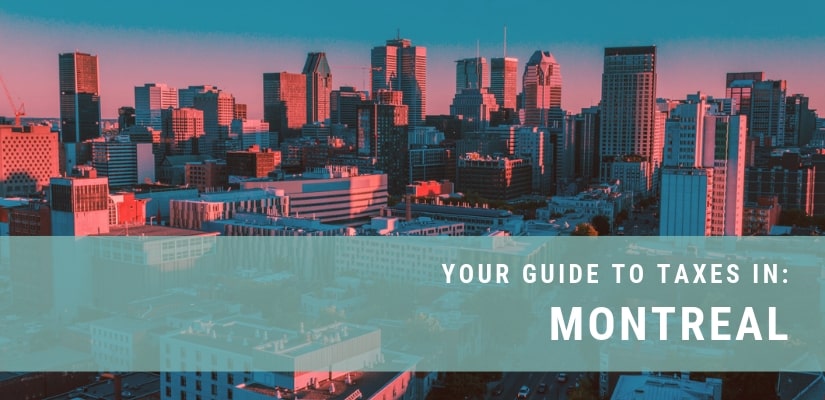
If you work in Montreal you will need to pay tax on the income you earn. You will have to pay both Federal and Québec provincial tax rates if you earn above the tax-free thresholds.
And the more you earn, the more you pay!
TABLE OF CONTENTS
You can earn an income of up to $14,398 in 2022 before paying any federal tax on your income.
Federal tax rates in 2022
| Taxable Income 2022 Tax Brackets | Federal Tax Rate |
|---|---|
| On the first $50,197 of taxable income | 15% |
| From $50,197.01 up to $100,392 | 20,5% |
| From $100,392.01 up to $155,625 | 26% |
| From $155,625.01 up to $221,708 | 29% |
| Over $221,708 | 33% |
The provincial tax rates for Québec are as follows:
| Taxable Income 2022 | Quebec Tax Rates 2022 |
|---|---|
| First $46,295 | 15% |
| Over $46,295.01 up to $92,580 | 20% |
| Over $92,580.01 up to $112,655 | 24% |
| Over $112,655.01 | 25.75% |
*The basic personal amount for provincial tax in Québec is $16,143. This amount will be deducted from your taxable income.
When you get paid, you can see how much tax, insurance and pension you have paid.
Do I need a Canadian Tax Number?
You will need a SIN (Social Insurance Number) if you are working in Canada.
This number ensures you are taxed the correct amount. You will end up paying more tax if you don’t get a SIN.
To get your SIN, temporary residents must provide an original of one of the following:
- Work permit issued by IRCC or CIC
- Study permit issued by IRCC or CIC, that:
- Indicates the permit holder ‘may accept employment’ or ‘may work’ in Canada; or
- Is accompanied by a ‘confirmation to work off-campus’ letter issued by IRCC or CIC.
What’s a TD1 Form?
You will need to fill out a TD1 form when you start working in Canada. These forms are used to tell your employer how much tax to deduct.
If the information on your TD1 form is not accurate you may end up underpaying tax.
You’ll complete TD1 when you start a job for the first time in Canada and:
- any time you get a new employer
- if you want to change credit amounts from previous years
- if you want to claim a deduction for living in a prescribed zone
- to increase the amount of tax deducted at source
If you work in Québec, you should use the Federal TD1 and provincial Form TP-1015.3-V, Source Deductions Return.
You May Also Like:
Accommodation in Montreal
What is the 90% rule?
If you earn more than 10% of your income outside of Canada in a tax year, then you shouldn’t claim personal tax credits in Canada.
If this is the case, you should enter 0 in box 13 of your TD1 form. If you claim the benefits and you’re not entitled to them, you may end up owing money to the Canadian authorities.
If you’re a non-resident, you won’t be taxed on foreign income you earn while in Canada but the Canadian Revenue Agency (CRA) requires you to state how much you earned so that they can determine whether or not you’re entitled to personal tax credits.
What’s a T4?
A T4 or Statement of Remuneration Paid shows the amount of tax you paid throughout the year. This information is used when filing your tax return and to claim back overpaid tax.
You will receive your T4 form from your employer by February. If you do not receive it you should contact them directly to request it. Alternatively, Taxback.com offers a document retrieval service. Their team can help you track down your missing documents.
Can I claim expenses?
If you earn over the tax-free amount, you may be able to claim certain expenses.
Examples of possible expenses include:
- Medical (for example – visit the doctor, prescriptions, and surgery)
- Travel Expenses
- Tuition fees
- Donations
- Union dues
- Business (for example – rent, supplies, travel, and professional fees)
Make sure to keep receipts and records for these expenses if you want to claim them. Taxback.com can tell you what you’re owed if you’re unsure.
You May Also Like:
HOW TO FILE YOUR CANADIAN TAX RETURN AS AN INTERNATIONAL STUDENT IN 2021?
Can I claim a tax refund?
You should file a tax return if you want to claim a refund.
If you overpaid income tax, pension or employment insurance contributions then you may be due a refund.
How much you can claim depends on any number of factors, including:
- Your residency status
- How long you worked
- How many jobs you had
- The income you received from overseas
- How much tax you paid
- If a tax treaty is applicable
The easiest way to find out if you’re due a refund is to apply with Taxback.com for a free refund estimate.
Want to claim a tax refund?
You can file your federal tax return directly yourself with the Canadian Revenue Agency and with Revenue Québec for your provincial return.
If you don’t want to do it yourself Taxback.com can do it for you!
They will take care of all the paperwork, prepare your tax return, and transfer your maximum tax refund straight to your bank account.
Don’t forget, the deadline for filing your tax return and paying any balance of tax due is 30 April 2022.
*Updated On April 7, 2022

